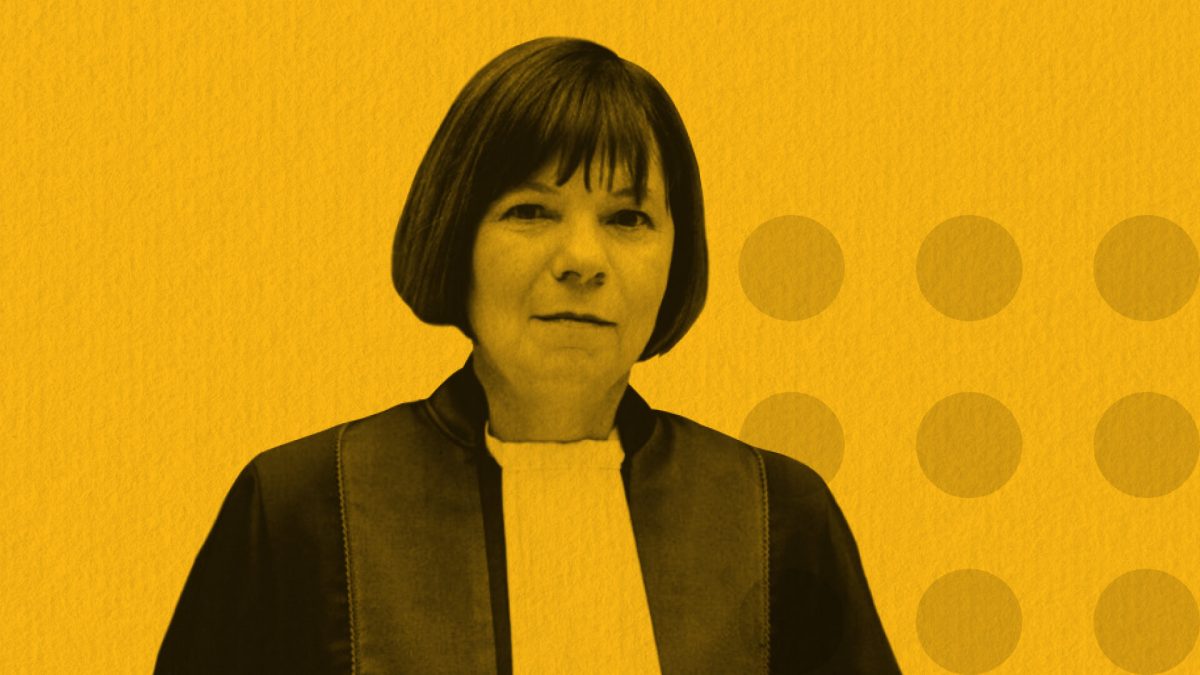The sky above the Netherlands is delft blue and nearly cloudless. A couple slowly pedal old black bicycles down the broad strand as sailboats catch a stiff wind out on the North Sea.
This is Kimberly Prost’s seaside home, a 19th-century Victorian apartment with one of the prettiest views in The Hague.
Three years ago, Prost [LLB/81] was elected as a judge of the International Criminal Court (ICC) for a nine-year term, giving her a window into the worst of human behaviour as she adjudicates over global atrocities. She is only the second Canadian to sit on the 18-member ICC and the first Canadian woman.
It’s a demanding position, survived by putting work and the rest of life into their own boxes.
“I learned from my colleagues on the bench that you really have to quickly develop that separation,” says Prost. “And if you can’t do that, you shouldn’t be there. I would sit on my balcony and stare at the sea. Whatever it might be, you find your ways of coping.”
The endless horizon, with its choppy grey waves, were her refuge through one of the most challenging trials of her career.
Prost sat on the International Criminal Tribunal for the former Yugoslavia (ICTY) and for four years, beginning in 2006, heard the trial of seven men accused over their alleged involvement in the Srebrenica genocide.
It dealt with the massacre of 8,000 men and boys killed during the Bosnian War in 1995. Also named as victims were more than 25,000 women, children and elderly who were abused and removed from their village.
The accused were charged with war crimes, crimes against humanity and in the case of a few of them, genocide. Prost says a judge must put aside the horrible nature of a crime and access each person’s responsibility separately, solely on the basis of the evidence brought forward.
“You always have to remember that obligation and at the same time, as a human being, when you sit there and hear witnesses describing being at a massacre site, where they were hiding under bodies or people being separated—the women from the men—who then were never seen again…. We saw some horrible videos and you really must accept as a human being that you have a reaction. I think it’s a mistake as a judge to think that you’re immune in any way,” she says.
“I was with very seasoned judges and sometimes we might gather together after the hearing as colleagues and have a drink together, just recognizing that we have this human reaction. But it never ever affects how you assess the case or you can’t do the job.”
All of the accused were convicted with sentences that ranged from five years to life in prison.
The international criminal justice system has occupied more than half of Prost’s 30-year legal career, which began as a federal government lawyer and domestic prosecutor in Winnipeg and in Ottawa where she worked on drug, immigration cases, as well as international cooperation matters, after law school.
She has since worked with the Commonwealth Secretariat in London and the United Nations Office on Drugs and Crime in London and Vienna, and served as the first ombudsperson for the UN Security Council Al-Qaida Sanctions Committee in New York.
Before being elected to the ICC, Prost returned to The Hague as chef de cabinet to the ICC president.
In her various international roles, she has travelled extensively and has been to roughly 130 countries. She’s done a lot of work with African justice systems and says the continent is one she feels a particularly strong connection to.
When asked what she’s most grateful for in life right now, Prost cites the chance to be back in the courtroom, serving as a trial judge.
She is now hearing the case against Al Hassan Ag Abdoul Aziz, an alleged member of militant groups Ansar Eddine and Al Qaida, suspected of war crimes and crimes against humanity, including underlying alleged crimes of rape, sexual slavery and intentionally attacking religious and historic monuments within Mali.
SEEKING JUSTICE IN THE FACE OF ATROCITY
Speaking to her overall experience working in such a complex, global field, Prost says, “There is a sense you’re contributing in a small way—it’s such a big issue—to international criminal justice and justice for victims and peace and reconciliation, to an extent.”
The lesson she’s learned from both the ICC and the Yugoslav tribunal is justice must be the response to atrocity crimes.
“Unless you answer violence with justice, instead of revenge, you will constantly have these circles of atrocities. The cycle of violence and power is only broken, and constrained, by the rule of law,” she says.
“When I speak about the prevention of genocide, I talk about hearing witnesses, about the cycle of violence. For example, in the Yugoslav situation, we had witnesses who said this massacre was in revenge for something that happened centuries ago.”







